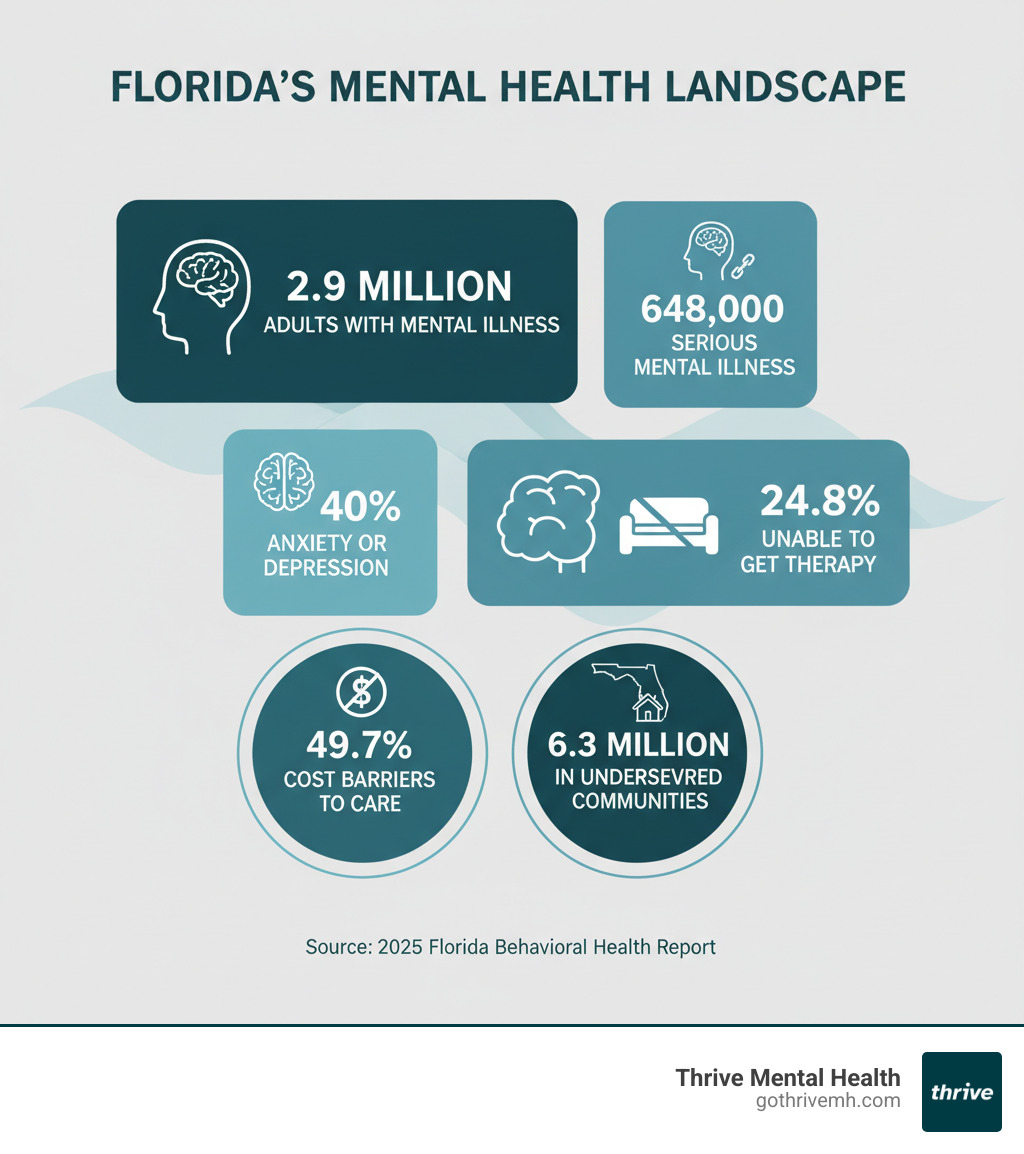Navigating Mental Health Support in Florida: Your Comprehensive Guide

Mental health support Florida 2025: Vital
Florida’s Mental Health Crisis Demands Immediate Attention
Mental health support Florida is more critical than ever. A staggering 2.9 million Florida residents have a diagnosed mental illness, and over 40% of adults have experienced anxiety or depression. Yet, nearly a quarter couldn’t get the help they needed, with cost being the biggest barrier.
If you’re searching for immediate mental health support in Florida, here are your key options:
- Crisis Support: Call or text 988 for the Suicide & Crisis Lifeline (24/7, free, confidential)
- State Resources: Contact 2-1-1 for local mental health services and community resources
- NAMI Florida: Call 1-800-950-6264 for peer support, education, and advocacy
- Professional Help: Use SAMHSA’s treatment locator at findtreatment.samhsa.gov
- Virtual Care: Consider online therapy platforms and virtual IOP/PHP programs
These numbers represent real people struggling with anxiety, depression, PTSD, and other conditions. The good news is that help is available. This guide will walk you through every resource, from state-funded programs to innovative virtual therapy, to help you find the right care.
I’m Anna Green, LMHC, LPC, Chief Clinical Officer at Thrive Mental Health. With experience delivering accessible mental health support through virtual-first IOP and PHP programs, I understand the challenges in accessing quality care in Florida and am here to help you steer your options.

Mental health support Florida terms explained:
- United Healthcare mental wellness
- United Healthcare partial hospitalization
- United Healthcare virtual therapy
Florida’s Mental Health Crisis: The Numbers You Can’t Ignore
Behind Florida’s sunny image lies a sobering reality. The data shows why mental health support Florida desperately needs is so critical: 2.9 million adults live with a diagnosed mental illness, and 648,000 of them struggle with a serious mental illness that significantly impacts their daily lives.
Anxiety and depression have reached crisis levels, with over 40% of Florida adults reporting symptoms. The access gap is equally concerning: nearly a quarter of adults who needed therapy—about 800,000 Floridians—couldn’t get it. For almost half of them, cost was the biggest roadblock.
Geography presents another challenge, as 6.3 million Floridians live in areas with a shortage of mental health professionals. This scarcity particularly affects rural counties, leading to long wait times and more people going without care.
Our youth are also struggling. About 180,000 Florida teens aged 12-17 have depression, yet nearly two-thirds received no treatment in the past year. The most tragic outcome is suicide, which claimed 3,567 lives in Florida in the most recent year of data, while 610,000 adults reported having suicidal thoughts.
These statistics reveal how the link between mental and physical health affects entire communities. But they also show us where to focus our efforts, turning every barrier into an opportunity to build a bridge to better care.
In Crisis Now? Where to Get Immediate Help in Florida
If you are in crisis or having thoughts of harming yourself, call or text 988 immediately. Help is available 24/7, it’s free, and it’s confidential. You are not alone.
When you’re in a mental health crisis, you need help now. The good news is that mental health support Florida includes several immediate crisis resources just a phone call or text away.
-
The 988 Suicide & Crisis Lifeline: Call or text 988 to connect with a trained crisis counselor. It’s free, confidential, and available 24/7. Calls from Florida are routed to a local crisis center.
-
Crisis Text Line: Text “HELLO” or “HOME” to 741741 to connect with a live, trained crisis counselor via text message. This is ideal if you can’t speak aloud or prefer typing.
-
Veterans Crisis Line: Veterans can call 1-800-273-TALK (8255) and press 1, or text 838255. Counselors are trained to handle the unique challenges veterans face.
-
The Trevor Project: A safe space for LGBTQ youth. Call 1-866-488-7386, text ‘START’ to 678-678, or use their online chat for specialized support.
-
National Domestic Violence Hotline: Call 1-800-799-SAFE (7233) or text “LOVEIS” to 22522 for 24/7 confidential support with safety planning and local resources.
Knowing when to call 911 versus 988 is lifesaving. Call 911 for immediate physical danger, such as an active suicide attempt or medical emergency. Call 988 for mental health crises and emotional distress when there is no immediate physical danger. It’s an emergency room for your mind, designed for compassionate support.
Reaching out for help is the bravest thing you can do. These crisis lines exist because you matter and people want to help.
Your Florida Resource Directory: State, National, and Non-Profit Support
Navigating your options for care can be overwhelming, but Florida has an extensive network of resources. Here’s a breakdown of the key providers of mental health support Florida offers.
State-Funded Programs and Initiatives
- Florida Department of Children and Families (DCF): Your central hub for crisis support and social services, connecting mental health care with essentials like housing and food.
- Hope for Healing initiative: A streamlined website championed by First Lady Casey DeSantis that connects you directly to mental health and substance abuse resources across state agencies.
- Managing Entities (MEs): Regional coordinators that partner with local providers to build a comprehensive network of care in your area.
- Community Mental Health Centers (CMHCs): These centers offer a range of services, from therapy to crisis intervention, on a sliding fee scale based on income, making care accessible without insurance.
- The 211 Network: Dial 2-1-1 to connect with local experts who can refer you to mental health services, housing assistance, and more. It’s confidential, anonymous, and available 24/7.
National Resources for Floridians
- Substance Abuse and Mental Health Services Administration (SAMHSA): The federal government’s hub for practical tools and research-backed treatment information.
- SAMHSA’s National Helpline: Call 1-800-662-HELP (4357) for a 24/7 confidential referral service to find treatment facilities and support groups in Florida.
- National Institute of Mental Health (NIMH): The leading federal agency for research on mental disorders, offering evidence-based information to help you make informed decisions.
- Find Treatment Locator: Use SAMHSA’s tool at findtreatment.samhsa.gov to search for providers by location, service type, payment options, and more.
The Role of NAMI in Providing Mental Health Support Florida
NAMI Florida is a grassroots organization focused on community and family support.
- Peer-to-Peer Support Groups: Free, confidential meetings led by people with lived experience, providing a safe space for healing.
- Family-to-Family Programs: Educational programs for family members and caregivers, offering coping skills and a connection with others on similar journeys.
- Advocacy and Education: NAMI Florida actively advocates for better mental health policies and offers educational classes like “NAMI Basics” for parents of children with mental health conditions.
Visit NAMI Florida’s website to find support, volunteer, or get involved.
How to Find the Right Therapist and Treatment Program in Florida
Finding the right provider is a crucial step in getting effective mental health support Florida. Understanding your options makes the process much easier.
Types of Mental Health Professionals
Different professionals offer unique expertise. Here’s a quick guide:
- Psychiatrists (MD): Medical doctors who can prescribe medication and focus on the biological aspects of mental health.
- Psychologists (PhD/PsyD): Experts in psychological testing, diagnosis, and specialized therapies like CBT or DBT.
- Licensed Mental Health Counselors (LMHC): Provide individual, group, and family counseling with a focus on mental wellness.
- Licensed Clinical Social Workers (LCSW): Offer therapy while also considering environmental and social factors, often helping with case management.
- Licensed Marriage and Family Therapists (LMFT): Specialize in relationship dynamics for individuals, couples, and families.
| Professional Type | Credentials | Can Prescribe Medication | Primary Focus |
|---|---|---|---|
| Psychiatrist | MD | Yes | Medication management, biological treatment |
| Psychologist | PhD/PsyD | No | Therapy, psychological testing, specialized treatments |
| Licensed Mental Health Counselor | LMHC | No | Individual/group counseling, personal growth |
| Licensed Clinical Social Worker | LCSW | No | Therapy plus social/environmental factors |
| Licensed Marriage & Family Therapist | LMFT | No | Relationship and family dynamics |
Verifying Credentials and Finding a Provider
Always verify a provider’s credentials to ensure they are qualified and in good standing. Use the Florida Department of Health MQA Search Portal at mqa-internet.doh.state.fl.us/MQASearchServices/Home to check their license status. Directories like Psychology Today are a good starting point, but always cross-reference with the DOH portal. Many therapists offer a free 10-15 minute consultation call, which is a great way to see if they’re a good fit. For more guidance, see our tips for choosing an ideal therapist in Florida.
Understanding Insurance for Mental Health Support Florida
Navigating insurance is key to affordable care. Understand the difference between in-network (lower cost) and out-of-network providers. Before starting, call your insurance company and ask: What are my mental health benefits? What is my co-pay and deductible? Are virtual sessions covered? Major insurers in Florida include Florida Blue, Cigna, Aetna, and UnitedHealthcare/Optum. We can help you with navigating mental health support with Aetna and UnitedHealthcare. For trends impacting coverage, see how Florida Blue is changing health insurance.
Custom Support: Resources for Florida’s Diverse Communities

One-size-fits-all approaches to mental health support Florida don’t work for its diverse population. Specialized resources are available to provide care that understands unique experiences.
Youth and Young Adults
With 180,000 Florida teens facing depression, targeted support is essential.
- The Florida Department of Education’s Resiliency and Mental Health portal is a one-stop shop for students, parents, and educators.
- Many schools offer school-based mental health services, bringing counseling directly to students.
- NAMI on Campus chapters provide peer support for college students.
Veterans and First Responders
Florida offers specialized support for the invisible wounds carried by veterans and first responders.
- The Florida Department of Veterans’ Affairs connects veterans with providers who understand military culture and trauma.
- The Veterans Crisis Line (1-800-273-TALK, press 1) is staffed by people who understand the military experience.
- Many fire and police departments have peer support networks for first responders to talk with colleagues who understand the job’s unique stresses.
Other Key Populations
- Seniors can find resources for depression and social isolation through the Florida Department of Elder Affairs.
- New parents can connect with Postpartum Support International’s Florida chapters for help with perinatal mood and anxiety disorders (PMADs).
- BIPOC and LGBTQ+ communities can find culturally competent providers who understand their unique experiences through networks like the Florida Behavioral Health Association.
For more, see our guide on Florida Adult Mental Health.
Virtual Therapy in Florida: Is Online Counseling Right for You?
Virtual therapy has revolutionized how Floridians access mental health support Florida needs. It offers expert care without the traffic, waiting rooms, or scheduling conflicts of traditional therapy.
Benefits of Virtual Care
Virtual therapy is a preferred choice for many due to its powerful benefits:
- Accessibility: It brings expert support to rural areas or communities with few local providers.
- Convenience: Flexible scheduling, including evening options, fits into busy lives.
- Reduced Stigma: Receiving care from the comfort of your own home can make it easier to open up.
- Proven Effectiveness: Research shows that virtual IOP and PHP programs are just as effective as in-person treatment for conditions like anxiety and depression.
Technology plays a crucial role in creating a seamless and deeply human therapeutic experience online.
What to Expect from Virtual IOP and PHP
Virtual Intensive Outpatient (IOP) and Partial Hospitalization (PHP) programs offer a higher level of care that fits into your life. These structured programs include:
- Group Therapy: Connect with peers facing similar challenges in a supportive environment.
- Individual Counseling: Work one-on-one with a primary therapist on your personalized treatment plan.
- Psychiatric Care: Access psychiatric evaluations and medication management when needed.
- Family Involvement: Education and therapy sessions help loved ones support your recovery.
- Evidence-Based Approaches: Treatment is built on proven methods like Cognitive Behavioral Therapy (CBT) and Dialectical Behavior Therapy (DBT).
Our Virtual IOP South Florida program offers this high level of care from wherever you feel most comfortable. Virtual mental health support Florida meets you where you are, removing barriers while delivering quality care.
Thrive serves Florida statewide—including Tampa Bay, St. Petersburg, Miami, and Orlando—and also provides virtual care in Indiana (Indianapolis, Fort Wayne) and California (Sacramento, Los Angeles, San Diego), so you can stay connected to support if you travel or relocate.
Frequently Asked Questions about Mental Health Support in Florida
Here are straightforward answers to common questions about finding mental health support Florida.
How can I get mental health help in Florida with no insurance?
You have several options. Start by dialing 2-1-1 for free, confidential referrals to local resources. Look for community mental health centers in your county, which offer services on a sliding scale based on your income. Additionally, organizations like NAMI Florida provide free peer-support groups.
How much does therapy typically cost in Florida?
Therapy costs in Florida generally range from $75 to over $250 per session. The price depends on the provider’s credentials and location. Using an in-network insurance provider is the best way to lower costs, as you may only be responsible for a small copay. Community health centers are another affordable option.
What is the Baker Act in Florida?
The Baker Act is a Florida law that allows for involuntary mental health examination. It can be initiated when a person is believed to have a mental illness and poses a danger to themselves or others. The act permits an emergency evaluation for up to 72 hours in a designated facility to ensure the person’s safety and determine the necessary level of care.
Is online therapy covered by insurance in Florida?
Often yes. Many plans (Florida Blue, Cigna, Aetna, Optum/UnitedHealthcare) cover telehealth, including therapy, IOP, and PHP. Coverage varies by plan, so verify your benefits and ask about deductibles, copays, and any preauthorization requirements.
How do I choose between IOP and PHP?
Consider symptom severity, daily functioning, and safety. PHP is more intensive (more hours/days per week) and is ideal when you need structured daytime support. IOP provides high support with more flexibility. A licensed clinician can recommend the right level of care after an assessment.
FAQ schema (JSON-LD)
{
"@context": "https://schema.org",
"@type": "FAQPage",
"mainEntity": [
{
"@type": "Question",
"name": "How can I get mental health help in Florida with no insurance?",
"acceptedAnswer": {
"@type": "Answer",
"text": "Start by dialing 2-1-1 for local referrals. Many county community mental health centers offer sliding-scale services. NAMI Florida also provides free peer-support groups."
}
},
{
"@type": "Question",
"name": "How much does therapy typically cost in Florida?",
"acceptedAnswer": {
"@type": "Answer",
"text": "Sessions generally range from $75 to $250+, depending on credentials and location. In-network insurance lowers costs via copays; community health centers offer affordable options."
}
},
{
"@type": "Question",
"name": "What is the Baker Act in Florida?",
"acceptedAnswer": {
"@type": "Answer",
"text": "It allows involuntary examination when someone is believed to have a mental illness and is a danger to self or others, permitting up to a 72-hour emergency evaluation."
}
},
{
"@type": "Question",
"name": "Is online therapy covered by insurance in Florida?",
"acceptedAnswer": {
"@type": "Answer",
"text": "Many plans (Florida Blue, Cigna, Aetna, Optum/UnitedHealthcare) cover telehealth, including therapy, IOP, and PHP. Verify benefits for deductibles, copays, and authorization."
}
},
{
"@type": "Question",
"name": "How do I choose between IOP and PHP?",
"acceptedAnswer": {
"@type": "Answer",
"text": "PHP is more intensive and suited for higher needs; IOP offers strong support with more flexibility. A clinician will recommend the right level after an assessment."
}
}
]
}
Your Path to Healing Starts Today
Recognizing you need mental health support Florida is the first and most courageous step. While the statistics can be daunting, a wealth of resources is available to help you on your journey to recovery.
Taking action—whether it’s calling 988, dialing 2-1-1, or scheduling a consultation—is an affirmation that you deserve to feel better. Recovery is not just possible; it’s happening every day across Florida as people find the right tools and support to reclaim their lives.
At Thrive Mental Health, we’ve seen how flexible, high-quality care can transform lives. Our virtual and hybrid IOP/PHP programs, with evening options, are designed for busy adults who need support that fits their schedule.
Your healing journey is unique. The path you choose matters less than the decision to move forward.
Ready for support? Thrive offers virtual and hybrid IOP/PHP with evening options. Verify your insurance in 2 minutes (no obligation) → Start benefits check or call 561-203-6085. If you’re in crisis, call/text 988.

